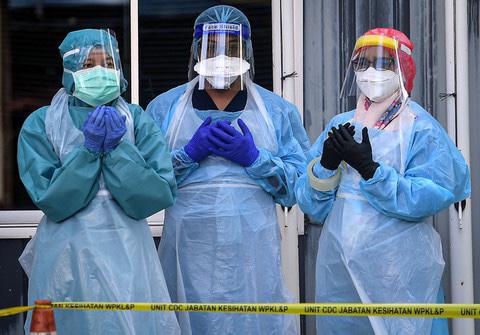KUALA LUMPUR, June 24 — Doctors, burned out 18 months into the Covid-19 epidemic, told the government to adopt a science-based exit plan, as hospitals are pushed to the brink.
Unimpressed by the National Recovery Plan announced by Prime Minister Muhyiddin Yassin last week, medical worker groups said Malaysia urgently needs a comprehensive plan that is firmly founded in scientific evidence, in line with international standards.
“The National Recovery Plan falls short of this standard,” doctors’ group Malaysian Medical Association (MMA) and its Section Concerning House Officers, Medical Officers, and Specialists (SCHOMOS) said in a joint letter yesterday.
“It merely stated the various indicators of the country’s readiness to progress to the subsequent phase of recovery, and fails to outline any measures the government will be employing to work towards those goals. Even then, those stated numbers are highly disputable,” the groups said.
The statement was directly addressed to Cabinet ministers, deputy ministers, MPs and the Dewan Rakyat Speaker and deputy speakers.
The current recovery plan — which expects to see most movement restrictions lifted only by year-end — hinges on three indicators: daily Covid-19 cases, intensive care unit (ICU) bed occupancy rates, and coronavirus vaccination.
“We cannot use gross numbers alone to guide public health decisions; rather, these decisions have to take into account a lot of other factors, such as daily positive detection rates, daily testing numbers, development of new clusters, and spread of new strains.
“How can we label our ICU usage as ‘moderate’ when many general wards are being repurposed into makeshift ICUs? Even with these makeshift ICUs, some hospitals have found it necessary to erect field hospitals for more ICU capacity,” the group said.
Both the MMA and SCHOMOS also questioned the government’s reluctance to report on positivity rates — the share of tests that show positive for Covid-19 — which they described as a more accurate indication of the extent of the pandemic in Malaysia.
The World Bank yesterday also criticised Malaysia’s low testing and high positive rate that exceeded the World Health Organization’s (WHO) recommended five per cent, or ideally three per cent, benchmark positive rate that indicates sufficient testing.
Malaysia’s positive rate in the past four weeks from May 23 to June 19 ranged from 6.61 per cent to 7.28 per cent, reaching 6.93 per cent in the 24th epidemiological week from June 13 to 19. Testing consistently declined in the past month from an average of 109,601 people tested daily in the week of May 23-29 to just 80,165 testings a day in the week of June 13-19.
Amid reduced testing, reported Covid-19 cases also fell from an average of 7,631 daily infections in the week of May 23-29 to 5,559 daily cases in the week of June 13-19.
Despite a reduction in reported infections, Covid-19 fatalities and ICU occupancy rates remain high. On June 21, Health Minister Dr Adham Baba said the Covid-19 ICU bed occupancy rate nationwide was at 92 per cent, with 1,096 patients (confirmed, suspected, and probable Covid-19 cases) filling 1,187 beds.
The government has set a maximum seven-day daily average of 4,000 coronavirus cases and maximum 70 per cent ICU bed occupancy to move into Phase Two of movement restrictions, even as the nation’s total lockdown is scheduled to end on June 28.
“Our Malaysian health care system is suffering, and it is barely holding the fort during this Covid-19 pandemic. Its resilience will be tested many more times in future pandemics to come. The time to fortify our public healthcare system is now. We have done our duty. We leave it to those who helm the power to rule hereafter,” MMA and SCHOMOS said.
The rise in burnout syndrome among health care personnel in the country, especially during the epidemic, further highlights a severe lack of human resource in the public health care system despite a seemingly healthy doctor-to-population ratio, they said.
“Physical capital can be bought in a matter of days, but human capital requires decades of nurturing. Manage the latter poorly, and we will surely see a tsunami wave of brain drain,” the group said.
MMA and SCHOMOS pointed out that the government has yet to resolve the issue of contract doctors who do not receive permanent posts in the government.
“The current contract system is messy, biased and a failure as it has given them uncertainty in their employment in the government service and in their future as health care professionals.”
Dr Adham said in a statement yesterday that permanent posts are given based on vacancies, as the Ministry of Health (MOH) is subject to the government’s rightsizing policy for the civil service.
“Permanent posts exceeding current vacancies are not permitted and can invite audit censure,” said the health minister.
“Applications for job posts must be forwarded to the federal agency that takes into account the actual number of vacancies in current and new facilities. The addition of vacancies is not made based on the increasing number of medical graduates every year.”
MMA and SCHOMOS added that the critical allowance given to government health care workers — which the Pakatan Harapan administration nearly revoked last year, but maintained amid widespread outrage — should instead be increased if a review is conducted.
MMA said it has asked the prime minister for an urgent audience since January 18 but has yet to be given a scheduled date.








